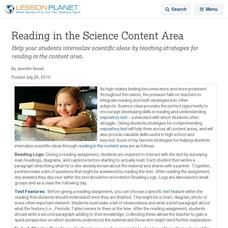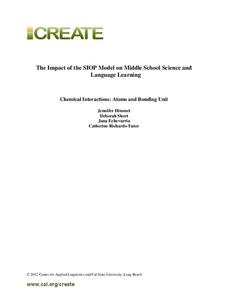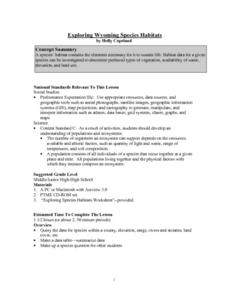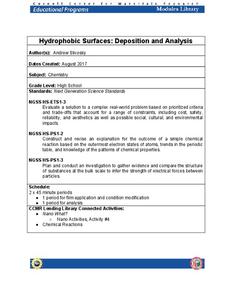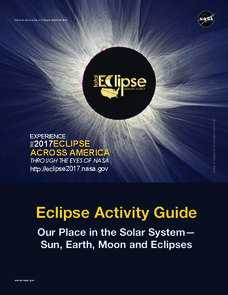National Science Teachers Association
Hop into Action
Young scientists find out what makes amphibians such unique and interesting animals in this simple life science lesson plan. After looking at pictures and discussing the characteristics of amphibians, learners complete a series of three...
Curated OER
The Carbon Cycle
Here is an interesting science lesson. Pupils discover that carbon, just like water, is absolutely necessary for all living things to survive. They study how it cycles through nature, become familiar with the periodic table, and look at...
Teach Engineering
Understanding Elements
Nothing says organization quite like a table. The third lesson in a six-part Mixtures and Solutions unit teaches young scientists about elements and the periodic table. They learn how the periodic table is organized and about the...
Curated OER
Elements Commercials
Student teams use a digital camcorder and iMovie to create a commercial about an element. They also use the Internet and their textbook to gather the following information about their element: the name, the symbol, the atomic number, the...
Curated OER
The Nature of Salt
Students record information from the periodic table for sodium and chloride. They determine whether salts are molecular or ionic compounds, along with sodium chloride's molecular weight, and relative weights
Serendip
How Do Biological Organisms Use Energy?
When an organism eats, how does food become energy? Young biologists follow glucose through the process of cellular respiration to the creation of ADP using a discussion-based activity. The resource also highlights conservation of mass...
Curated OER
Reading in the Science Content Area
Help your students internalize scientific ideas by teaching strategies for reading in the content area.
Cornell University
Isotope Rummy
Thanks to this game, teaching isotopes will never be the same. Physical science scholars work their way toward understanding isotopes in an entertaining game. Pupils play rummy in groups while practicing good sportsmanship and creating...
Institute of Electrical and Electronics Engineers
Playing with Parachutes
This lesson certainly will not be a drag! Little engineers design parachutes that make use of air resistance and, as a result, slow the descent of the payload as much as possible. It is an opportunity to teach about many motion concepts:...
Towson University
Looking Backwards, Looking Forward
How do scientists know what Earth's climate was like millions of years ago? Young environmental scholars discover how researchers used proxy data to determine the conditions present before written record. Grouped pupils gain experience...
NASA
Connecting Models and Critical Questions
Scholars use data to analyze and determine which sets of information need to be counted. They create a model to explain differences among chemical elements using graphs to prove concept mastery.
Towson University
The Crucial Concentration
Which sports drink provides the best pick-me-up after the big game or grueling workout? It may not be the one you'd think! Food science is the focus in a surprising lab activity. Pupils use colorimetry to determine the amount of protein,...
Center for Applied Linguistics
Chemical Interactions: Atoms and Bonding
Watch budding chemists interact with the resource on chemical interactions. In the unit, six lessons provide an overview of basic chemistry, from understanding the development of atomic theory to distinguishing between ionic and covalent...
Curated OER
The Periodic Table
Students research an assigned element using the library, an encyclopedia, the Internet and other appropriate resources in order to write a research paper, a project, and an oral presentation.
Curated OER
Exploring Wyoming Species Habitats
Students are introduced to the concept of species habitats and ranges. They introduced to ArcView GIS as a tool for mapping. Pupils use query data for species withina county, elevation, range, rivers and streams, land cover, and etc....
Curated OER
States of Matter
Students study the states of matter. In this matter lesson, students use dry ice to study the states of matter. Students observe and answer questions based on the material.
Cornell University
Hydrophobic Surfaces—Deposition and Analysis
Couches, carpets, and even computer keyboards now advertise they are spill-resistant, but what does that mean? Scholars use physical and chemical methods to coat surfaces with thin films to test their hydrophobic properties. Then they...
Royal Society of Chemistry
Acids and Alkalis
Is your acid-base chemistry lesson plan a little ho-hum? Spice things up with puzzles! Young chemists manipulate facts about acids and bases to solve a series of interactive puzzles. The activity combines content knowledge and...
Royal Society of Chemistry
Common Compounds
Can your young chemists identify the most commonly used chemicals in the lab? Introduce the class to the go-to substances in most middle and high school chemistry experiments with an interactive. The resource offers timely feedback as...
Teach Engineering
Bend That Bar
Bend it, but don't break it. Groups investigate the strength of different materials. Using a procedure in the seventh segment of a 22-part series on aviation, pupils determine how far a rod will bend. They determine the strength-to-mass...
Curated OER
Under the Sea - KWL Chart
Students create a KWL chart to start the discussion on ocean animals. They practice sorting the animals into their different classifications. They use indexes, table of contents and glossary to find information.
NASA
Eclipse Activity Guide
Ever made solar s'mores? Or recreated the solar system using peanuts? Astronomers young and old investigate all things solar using a variety of activities. Explore how the sun works, types of light it emits, and methods of charting the...
PricewaterhouseCoopers
Conservation: Water
Here is a fantastic experiment-based lesson on water conservation, waste, and filtration. The lesson plan is well-developed and provides background information, discussion leads, and six scripted lab activities anyone can do. The class...
PricewaterhouseCoopers
Waste and Recycling: Recycling Paper
We take paper for granted, while thousands of trees are being made into the paper we toss in the trash. Start a dialogue about paper reduction and recycling in class, and share the negative effects paper production has on our ecosystem....








